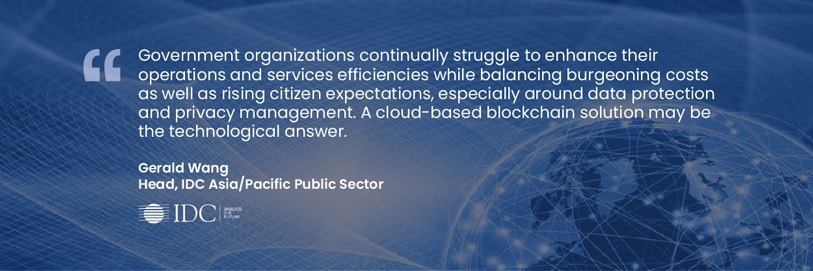Blockchain for Government and Public Sector: IDC Report Highlights Key Considerations
A new market note by research firm, IDC entitled: ‘Blockchain for the Future of Governments—Exploring New Competencies and Attaining Public Trust’ highlights some key considerations when evaluating blockchain technology and some of the use cases gaining traction. Here I will highlight some of those findings. R3 is pleased to be able to exclusively share the full report for you here.
How the banking industry is paving the way for blockchain technology for government services
91% of the Italian banking sector are live with a blockchain enabled solution (SPUNTA Banca DLT), coordinated by the Italian Banking Association–ABI Lab in May–with 100 banks in production. They have processed 204 million transactions from March 1st through October 1st.
In December 2019, Commerzbank, Credit Suisse and UBS executed the first live transactions on the Deutsche Börse-HQLAx securities lending platform.
As proof in production on the commercial side mounts, the private and public sector alike are taking notice of potential blockchain uses and applications. The use of Corda in the US by the likes of Wells Fargo and Nasdaq, in Europe by SIX Digital Exchange, Mastercard and the UK’s Food Standards Agency, and in Asia through projects by the Monetary Authority of Singapore and the central banks of Thailand and Hong Kong–has blazed a trail for governments to follow along.
Blockchain for governments must address privacy, security and scalability
Governments are increasingly distinguishing between permissioned and permissionless blockchains, understanding their risk profiles, and how to use blockchain technology for government services; they are also understanding the characteristics that they are seeking in a system, which are most importantly data privacy and control and scalability.
Governments are digitalizing globally. In the report, research firm IDC predicts that by 2023, 20% of governments will issue blockchain-enabled identities, which they will use from birth to death.
The trends IDC are witnessing in Asia and worldwide mirror our own engagements with global public sector institutions and the interest in public sector applications. Gerald Wang, Head, IDC Asia/Pacific Public Sector told us: “Blockchain is on pace for wider acceptance and adoption in Asia Pacific Public Sectors. As more transactions and services are getting shifted to digital platforms, public sector decision makers will be interested in the accuracy and legitimacy in the system that can be obtained by blockchain-supported transactions. There will be a need to ensure the blockchain platform is scalable and compliant and supports interoperability.”
Where are governments focusing their digitization efforts?
Aside from identity, which is a core focus of many governments–in Singapore and Zug, Switzerland, to name a few–there are several other use cases in development in the public sector. In food tracking, the UK Food Standards Agency recently completed a proof of concept on Corda tracking pork to ensure food is provided in compliance with food safety regulations. Utilizing Corda, the agency is able to more transparently identify when there is any pork that needs to be removed from supply and do so efficiently. In Central Bank Digital Currency, Sweden’s Riksbank is modeling its e-krona on Corda.
In an article for the UK’s Financial News, Todd McDonald, R3’s Chief Product Officer highlights that public-private partnerships are key for the development of CBDCs, but that is true in other areas as well. Success in the public sector requires a mix of the right partners and the appropriate technology. R3 is committed to helping foster the digital transformation and the application of blockchain for governments globally. We are working with governments around the world on use cases from procurement and fund distribution to land and vehicle registries.
The full IDC report is available for download here.
We are offering one-on-one virtual workshops to explore public sector use cases that are ripe for digital transformation. Please reach out to me at [email protected] to learn more.




